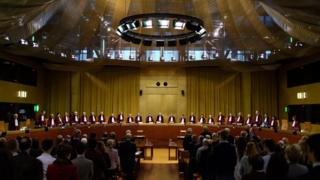 Image copyright
ECJ
Image copyright
ECJ
The UK should be able to unilaterally cancel its withdrawal from the EU, according to a top European law officer.
The non-binding opinion was delivered by the European Court of Justice's advocate general.
A group of Scottish politicians has asked the court whether the UK can call off Brexit without the consent of other member states.
The Court of Justice (ECJ) will deliver its final ruling at a later date.
The advice from advocate general Manuel Campos Sanchez-Bordona comes as the House of Commons begins five days of debates on Prime Minister Theresa May's proposed Brexit deal, with a vote due to be held next Tuesday.
In a written statement, the ECJ said Mr Campos Sanchez-Bordona's opinion is that if a country decides to leave the EU, it should also have the power to change its mind during the two-year exit process specified in Article 50 of the EU treaty.
And it should be able to do so without needing the consent of the other 27 member states.
While the advocate general's opinions are not binding, the court tends to follow them in the majority of its final rulings.
The anti-Brexit politicians and campaigners who have brought the case hope it will give MPs an extra option when considering whether to approve Mrs May's draft deal or not, because it could keep alive the prospect of calling off Brexit - potentially through another referendum.
The ECJ statement said the advocate general had proposed that the Court of Justice should "declare that Article 50 allows the unilateral revocation of the notification of the intention to withdraw from the EU".
It added: "That possibility continues to exist until such time as the withdrawal agreement is formally concluded."
The UK is due to leave the EU on 29 March next year, but the deal negotiated with the EU has to be backed by a majority MPs if it is to come into force.
The case has been brought by a cross-party group of politicians including Green MSPs Andy Wightman and Ross Greer, MEP Alyn Smith and MP Joanna Cherry of the SNP, and Labour MEPs David Martin and Catherine Stihler.
They initially brought it to the Court of Session in Edinburgh, which ultimately agreed to pass it to the ECJ.
Two attempts by the UK government to appeal against the referral to the European court were rejected, and the case was opposed by the government and the EU institutions in a hearing before all 27 ECJ judges last week.
Hubert Legal, the chief lawyer for the European Council, argued that allowing unilateral withdrawal could create "endless uncertainty" by allowing countries to announce they are leaving the EU in an attempt to secure better membership terms, before cancelling their withdrawal.
The UK government's lawyers argued that the case is purely hypothetical as "the UK does not intend to revoke its notification", and ECJ judges should therefore refuse to rule on it.
And they said the politicians behind the case want to use it as "political ammunition to be used in, and to pressure, the UK Parliament".